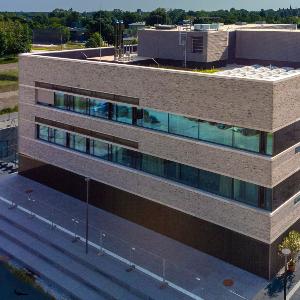
© LMU
- It was built to foster better research into zoonoses and help scientists develop methods to prevent their spread
- Housed across 2,885 sqm of floor space, the research labs, seminar rooms, offices, and an animal facility with very high safety standards offer optimal conditions for cutting-edge research to take place
For two years, the coronavirus pandemic had the world in its grip. But COVID-19 is not the only epidemic to have swept the globe in the past two decades alone. All zoonoses have one thing in common: they are pathogens that pass back and forth between animals and humans.
To enable scientists to better research these zoonoses and develop methods to prevent their spread, the Ludwig-Maximilians-Universität Munich (LMU) is now opening a state-of-the-art new building for the Institute of Infection Medicine and Zoonoses (Microbiology) of the Faculty of Veterinary Medicine on the Campus Oberschleissheim. The new building is one of the centerpieces of the expanding campus beyond Munich's northern municipal boundary. The three floors situated above ground level house laboratories, offices, and seminar rooms. The building, designed by Stuttgart-based firm bizer Architekten, has a usable floor space of 2,885 square meters, including the basement levels.
Minister for Science Markus Blume emphasizes: "Discovering all we can about the smallest of organisms: microbiology is a vital research field for us all. Bacteria, viruses, and fungi are often invisible to the naked eye, but have huge impacts on our lives. With the new Institute of Infection Medicine and Zoonoses in Oberschleißheim, we're creating optimal conditions for this highly important sphere of research, while also developing Germany's largest faculty of veterinary medicine in a visionary new direction. LMU is getting the best of the best here: We have invested over 73 million euros in the technically sophisticated building with very high safety standards."
"We are very pleased to be inaugurating the microbiology building on the Campus Oberschleissheim today," says Professor Bernd Huber, LMU President. "This new building is of great importance to the growing campus of LMU's Faculty of Veterinary Medicine and provides our scientists with ideal conditions for conducting their research of high societal relevance."
"With the range of topics it accommodates, the institute perfectly complements the research strategy of the Faculty of Veterinary Medicine on the new campus," says Reinhard Straubinger, Dean of the Faculty of Veterinary Medicine. "Our activities in the veterinary sphere are shaped by the one-health strategy," he continues. "Animal welfare and human welfare can be viewed as two sides of the same coin." Straubinger, who is now working in the new building with his Chair of Bacteriology and Mycology, studies bacterial pathogens that cause diseases in animals but have the potential to infect humans as well.
Professor Gerd Sutter has also moved his Chair of Virology into the new building. Sutter, an expert in vaccine research, has already developed a number of vaccines and is working in collaboration with the World Health Organization (WHO) and others on a platform designed to simplify and accelerate the development of vaccines. Both chairs were previously housed on the old campus of LMU's Faculty of Veterinary Medicine next to the English Garden.
The latest research results from virology and bacteriology/mycology require validation in animal models before they become relevant for clinical use. These crucial research steps will now be performed in the new Microbiology Institute's animal facility. Safety standards are of the highest level and the complex is equipped with a redundant technical infrastructure designed to prevent any risk to the environment. This combination of special laboratories for handling potentially infectious material and a facility housing animals only exists in about a dozen research centers across Germany. The particular advantage it offers is that having all of the research steps under one roof means that all necessary research can be conducted quickly and safely. The facility will be made accessible to other research institutes of LMU as well as to other institutions outside LMU once it has been established within the next few years.
Prof. Dr. Reinhard Straubinger LMU, Tierärztliche Fakultät
Dekan und Lehrstuhl für Bakteriologie/Mykologie






